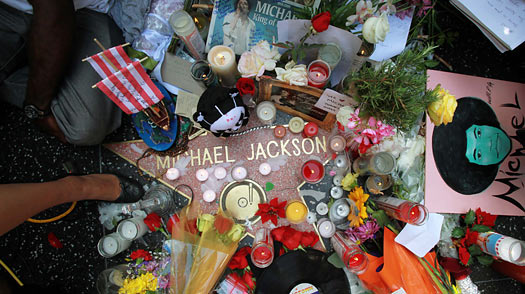
A sidewalk shrine of mementos, flowers, candles and notes adorn the star of Michael Jackson on the Hollywood Walk of Fame in Los Angeles.
(2 of 3)
Accounts differ on the state of Jackson's health in the days, weeks — even years — before he died. At least since his 2005 trial on child-molestation charges — charges he beat — reporters and other observers had noted his frail appearance and slow, almost pained carriage. Some suspected substance abuse; last year a British journalist reported that Jackson had a genetic disorder that weakens the lungs.
Jackson's camp had long denied that he had any serious health problems, and as the star rehearsed for 50 sold-out London concerts that were to begin July 13, he seemed to be himself again. Grammy Awards executive producer Ken Ehrlich, who attended a June 24 rehearsal, told People that Jackson had "great energy." He said the singer wasn't "giving it full out, but ... I thought he was in great form."
There was talk, however, that Jackson was taking painkillers to recover from the grueling pre-London sessions. For years, Jackson seems to have swallowed a variety of pills ad libitum. "I do not want to point fingers at anyone because I want to hear what the toxicology report says and the coroner says," former Jackson attorney Brian Oxman told CBS. "But the plain fact of the matter is that Michael Jackson had prescription drugs at his disposal at all times." People.com quoted a source close to the family as saying the pills included not just painkillers but also antianxiety meds like Xanax and Valium.
Even more troubling, a Jackson family member told TMZ.com that Michael had been receiving daily injections of Demerol, an addictive painkiller. In high enough doses, Demerol can slow respiration to the point of suffocation, which can deprive the heart of oxygen and lead to sudden death, according to Dr. Douglas Zipes, a past president of the American College of Cardiology. Jackson was fascinated with Demerol. On his 1997 track "Morphine" — an unusually discordant Jackson song — he sings, "Close your eyes and drift away Demerol ... Today he's taking twice as much Demerol." Deepak Chopra told CNN the day after Jackson died that one night when the singer stayed at his house, he asked if Chopra had any of the drug. Chopra told TIME that Jackson was "totally enabled by these Hollywood Mafia drug-dealer doctors who have medical licenses and should be brought to justice ... Instead of managing his stress, they would give him drugs."
And yet the cause of death could be something much more straightforward. After all, Jackson was a man who, as the singer Patti Austin told CNN, rarely ate right and didn't usually work out — he just worked. He may simply have had a heart attack. "When you live like a hummingbird," Austin said, "you don't have a long life span."
The second act of a celebrity tragedy is cleaner, simpler than the confusing first act: everyone suddenly begins to heap encomiums on the dead. After Diana was killed in a car crash in 1997, strangers hugged one another in the streets of London. Celebrities around the globe who had known Diana sent heartbroken tributes.
And so it was with Jackson. Brooke Shields called him an "extraordinary friend, artist and contributor to the world." Elizabeth Taylor said she and Jackson shared "the purest, most giving love I've ever known." On MTV, music writer Kurt Loder said Jackson's genius reached beyond singing and dancing. Jackson, he said, had been able to negotiate complex business deals with Sony in his spare time. In the days after Jackson's death, music critics stumbled over one another to praise him for the way he blended black music and white as well as for the rigor of his stage performances.